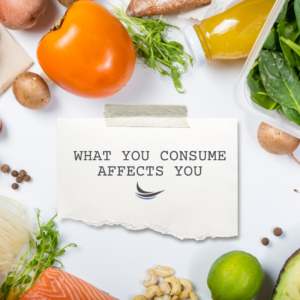 Consider the last 24 hours of your day.
Consider the last 24 hours of your day.
When was your last meal, snack, or drink before you went to sleep?
What did you eat? I’m curious to know the items, amounts, and how your body felt afterwards.
What did you drink? I’d love to know more about your drink(s) of choice. If you consumed alcohol, how many drinks?
Did you have any thoughts that impacted what you ate or drank? Perhaps loneliness, guilt, pleasure, or boredom?
How well did you sleep after eating and drinking?
Food impacts mood and sleep. It is known that high-carbohydrate meals can contribute to feeling tired and low-energy. Many tasty, convenience foods tend to be high in carbs but low in nutrition which have been shown to negatively impact quality of sleep.
Alcohol also impacts mood and sleep. Some people like to enjoy a drink before bed to “relax”. Alcohol is known as a central nervous system depressant with sedative effects; however, increased alcohol use is linked with poor sleep.
LOW amounts of alcohol decreased sleep quality by 9.3%
MODERATE amounts of alcohol decreased sleep quality by 24%
HIGH amounts of alcohol decreased sleep quality by 39.2%
You may be surprised to know that what is considered low, moderate, and high. Check this out:
A low amount of alcohol is considered less than 1 drink for women and less than 2 drinks for men.
A moderate amount of alcohol is considered 1 drink for women and approx. 2 drinks for men.
A high amount of alcohol is considered more than 1 drink for women and more then 2 drinks for men.
Those who struggle with sleep may find themselves snacking throughout the night, and often in larger amounts with less opportunities for activity during the night. Since many popular American snacks and drinks tend to be processed high calorie (high fat, high sugar) treats with little nutritional benefits, this can contribute to health risks. Maintaining a consistent sleep-wake schedule and sleeping well throughout the night can help deter late-night snacking and maintain a healthy weight.
A pattern of eating unhealthy foods can contribute to excess weight gain and obesity which in turn can be a risk factor for medical and sleep-related problems such as obstructive sleep apnea (OSA), which causes impaired breathing frequent awakening or binge eating-disorder.If you are seeking support for yourself or a loved one who may be struggling with an eating disorder, including binge eating, support is available-https://www.nationaleatingdisorders.org/help-support/contact-helpline. Talking with your doctor, a dietician, nutritionist, or mental health provider can also assist you with taking next steps towards a healthy eating.
Eating, physical activity, and sleep are all important aspects of a healthy lifestyle. Sleep plays an essential role in give both the body and the brain a break. Insomnia is a common sleep disorder that impacts one’s ability to fall asleep, stay asleep, or wake up too early with difficulty being able to resume sleep. Cognitive-behavioral-therapy-for insomnia (CBR-I) is considered an effective first-line treatment that can help. Wouldn’t feel great to wake up in the morning—feeling refreshed and well-rested?
Written By : Charlotte Johnson, MA, LPCC
We’re Here to help
Our wellness experts will be happy to take care of you. You can CLICK HERE to schedule an appointment now or call (612)223-8898.
Meet Clinicians
We’re united by our commitment to providing effective, relevant, and innovative mental health support at all stages of your journey. Click Here to find out more about who we are, where we come from, and how we live out CARE’s mission every day.
The professionals at CARE are actively collecting and creating resources to help with what you need. We’re Here for You.


